-
Our tongues might be one of our most underrated body parts. Not only do they help us talk, digest, and taste delicious food, they also offer valuable clues about our overall health. They can give an indication of your overall health, or signal that you might need to take better care of your oral health.
That’s why it pays to poke your tongue out in the mirror every now and then, and check for any signs worth flagging with your dentist or doctor. Read on to find out what your tongue might be telling you.
MORE: How asthma affects your oral health
A healthy tongue is typically a pinkish colour with small bumps coating its surface. Clinically speaking, these bumps are known as papillae. On an average adult tongue, these papillae contain around 9,000 taste buds enabling us to distinguish between different flavours, be it sweet, sour, salty or bitter.
What does your tongue say about your health?

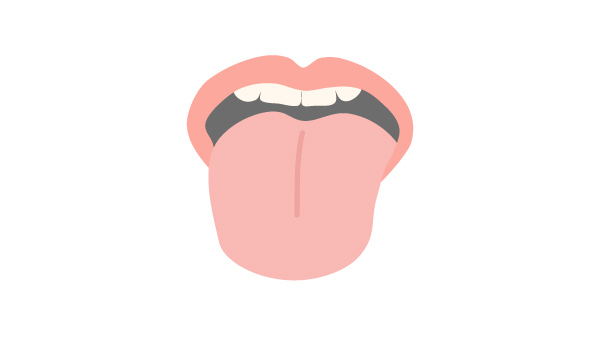
-
Alongside this description, it’s also helpful to be aware of the following conditions that can alter the appearance of your tongue and may suggest a wider problem.
White tongue
As the name suggests, this is when the tongue loses its normal pinkish colour and develops a white coating. This typically results from an overgrowth and swelling of papillae on the surface of the tongue causing bacteria, food, and dead cells to get trapped. As the debris accumulates, the tongue may gain a white appearance. This often coincides with bad breath.
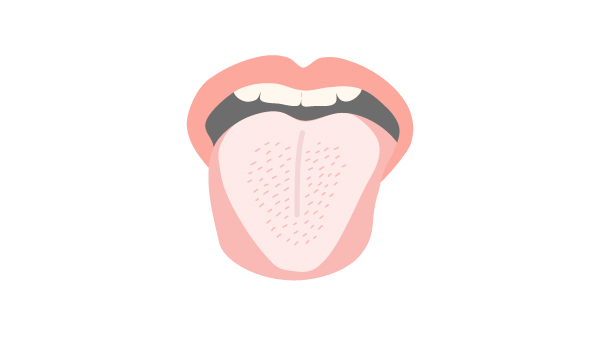
-
The major causes of white tongue are poor oral hygiene, dehydration, dry mouth and smoking. While white tongue is generally harmless, it can indicate a range of other health conditions. If the discolouration persists then it’s recommended you visit your doctor for a proper diagnosis.
Black hairy tongue
Once again, the clue is in the name for this one. It is characterized by a black coating over the tongue, but it can also be dark yellow, brown, green or white in colour. It is a rare condition that results from a buildup of dead skin cells on the tongue, causing the papillae to grow and lengthen in size, hence trapping excess bacteria. These long hair-like projections can in turn be stained by bacteria, black tea, coffee, tobacco, food or other substances.
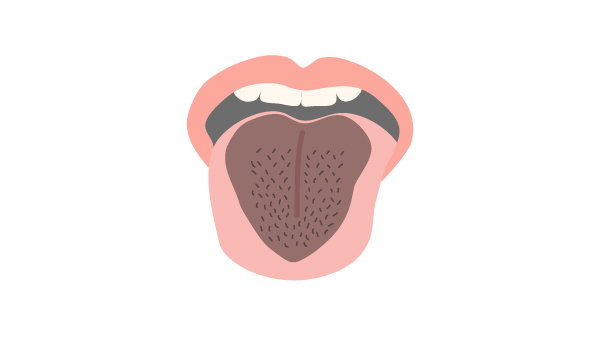
-
Similar to white tongue, this is most likely to result from certain lifestyle habits such as poor oral hygiene, smoking or use of particular antibiotics. Try brushing that area of the tongue with a soft-bristle brush and toothpaste two to three times a day, or using a tongue scraper. If the problem persists, it’s a good idea to visit your doctor to rule out other possible diagnoses.
Strawberry tongue
It sounds like something you get from eating a punnet in one sitting, but not quite. Strawberry tongue isn’t a condition itself but rather an appearance your tongue may develop -- bright red, swollen and bumpy-- as a result of an underlying health issue. This could range from a small B12 deficiency (a vitamin that helps us maintain healthy cells and DNA) to rarer infections, such as streptococcal.
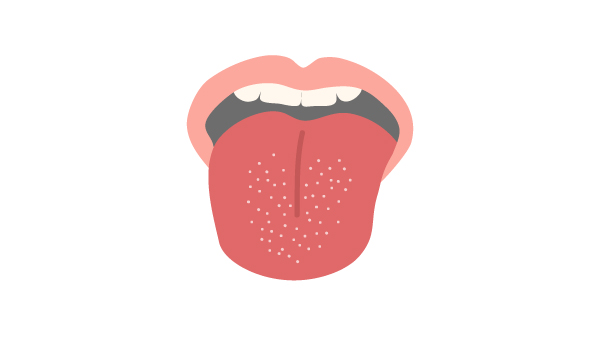
-
If you experience a swollen or strawberry tongue then it is a good idea to see your doctor straight away.
Oral thrush
Oral thrush is a condition in which candida, a normal fungus which is found in over half of our mouths, overgrows and causes white patches on the tongue. Sometimes oral thrush may spread to the roof of your mouth, inner cheeks, gums, or the back of your throat. The first thing people with oral thrush usually notice is discomfort in their mouth when they are eating. Other symptoms include pain and burning in the mouth, an unpleasant taste, or lack of taste, a red mouth and throat, and cracks at the edge of their mouth, In some cases, it may lead to irritation or bleeding, which can make it difficult to eat or swallow.
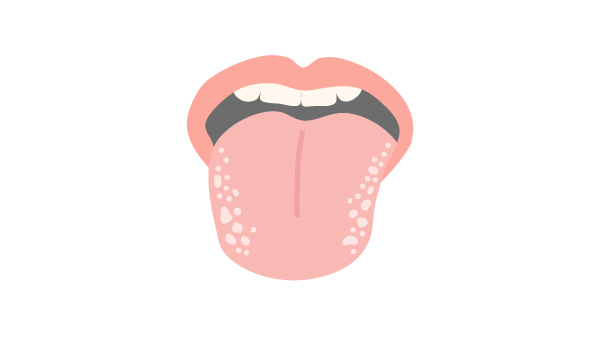
-
Oral thrush is more common in older adults or children with weakened immune systems and may suggest an underlying medical condition. It’s recommended you visit your doctor if you notice any symptoms of oral thrush so they can treat the condition and identify any underlying issues.
Oral (mouth) cancer
Different cancers can form on the tongue, lips and gums. Among the most common of these is squamous cell carcinoma. Those aged over 40, particularly those who smoke, are at increased risk of mouth cancer with most people first noticing a persistent sore or lump on the side of the tongue. Other symptoms include red or white patches and unusual bleeding or numbness.
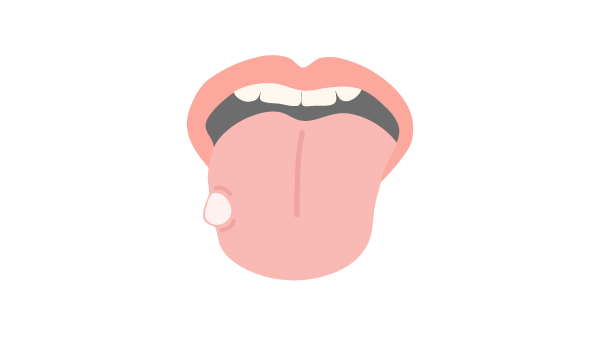
-
If you experience symptoms like these it’s important to visit your doctor as early as possible. The doctor will look at your medical history, ask specific questions about symptoms, and carry out an examination of the tongue and throat. Depending on the diagnosis, the doctor will decide on what treatment is required. If treated early, the prognosis for mouth cancer is generally good.
Keeping tabs on your tongue
Your tongue can offer some important clues about your health. Some are more serious than others and may require a doctor’s attention. It’s important to keep an eye on your tongue and ensure you take steps to keep your oral health in check. Here are some habits to help keep your tongue healthy:
- Brush your teeth twice a day: It’s important to brush thoroughly with a soft-bristled brush to remove any build up of bacteria in the mouth. Make sure to give your gums some attention, brushing the tooth where it meets the gum, as well as flossing.
- Avoid sugar: Bad bacteria in the mouth like to feed on sugary foods which can in turn damage your tooth enamel. Reduce your sugar intake to mitigate this nasty bacteria and promote better overall oral health!
- Quit smoking: Smoking can lead to tooth staining, gum disease, tooth loss, and in more severe cases mouth cancer. If you’re a smoker, think twice about having that next cigarette. Call the Quitline on 13 78 48 for support.
- Drink plenty of water: Dry mouth, or a lack of saliva, can lead to oral disease. Drinking enough water can help to keep the mouth moist. The fluoride in tap water also helps prevent decay.
-
Am I just worried, or is it anxiety?
Understand what’s healthy when it comes to feeling anxious.
-
Where to get health support in Australia
An Overseas Student Health Cover member’s guide to key health services and when to use them.
-
How can Australian pharmacies help you?
What can you buy at a pharmacy? Do you need a prescription? Can pharmacists identify health conditions? Everything international students need to know about pharmacies in Australia.
-
How to prevent type 2 diabetes with diet
Diet plays an important role in the prevention and management of type 2 diabetes. Here’s what you should and shouldn’t eat.
-
High blood pressure: how health cover can help
Put your health cover to use
-
Why you should get the 2023 flu vaccine
More than three years on from the start of the COVID-19 pandemic, getting a flu jab this winter is even more important. Here’s why.
Subscribe to receive the best from Live Better every week. Healthy recipes, exercise tips and activities, offers and promotions – everything to help you eat, move and feel better.
By clicking sign up I understand and agree to Medibank's privacy policy






